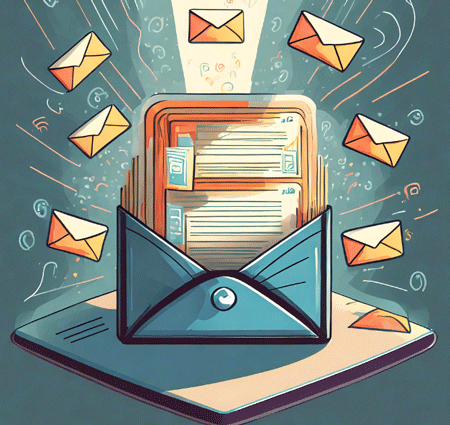AI and the productivity lie
Think twice about the pervasive idea that Generative AI is going to make you more productive. A look back on how email transformed our lives gives a hint about what’s coming with Gen AI.
By Brad Berens
A notion that pops up in many conversations about the benefits of Artificial Intelligence (AI)—particularly Generative AI (Gen AI)—is that this exciting new technology will lead to increased productivity.
Here’s one of numberless examples from Gideon Lichfield’s recent farewell Editor’s Note as he ends his tenure at Wired:
Professors, economists, and legal scholars could boost their own productivity, much as software engineers already use ChatGPT to pump out code that they can then inspect and test.
That would be scanned.

Generated by the author using Adobe Firefly Image 2 (beta)
Such productivity promises are hollow, which you can see by thinking about a similar case with the birth of email.
Back in the day, electronic mail (remember when that’s what we called it?) was going to increase our productivity because sending a digital message was instantaneous and didn’t require stamps, paper, or a Postal Service.
An early moment when I saw that email’s imagined efficiency wasn’t coextensive with reality came when my Italian professor in grad school moaned that email had ruined his ability to buy himself time.
He was running late on a journal article. In the paper mail days, he could send a question to the journal editor. The letter would take a week to get to the editor, who would take time to see it and reply, whereupon the editor’s reply would take another week. “But when I tried that with email I got a reply in minutes!” No sneaky extra time was to be had.
Sometimes friction in a system is good.
Plus, whenever you eliminate friction in a system then overall use of the system will usually increase. That can be a good thing (e.g., democratization of access), but not always.
Just as many people raised in a spellcheck world can’t tell the difference between the right word and the wrong word in a sentence when both are spelled right—the high comic genre of “Damn You, Autocorrect” emerges from this—there will be a distance between a superficial human understanding of something that AI generates and the deep understanding that comes from mastery. Also, as I wrote in “Artisanal Crap,” we human creators need a lot of practice before we’re skilled enough to make great stuff.
Remember Mickey Mouse as the Sorcerer’s apprentice with magical out-of-control bucket-carrying brooms in Fantasia? That was nothing.
Whatever time savings email gave us by dematerializing paper mail soon vanished because instead of a daily handful of paper letters we all sent and received and replied to and replied-all to and CC’d and BCC’d hundreds of emails. Then came email newsletters (like this one). Then came legit advertising emails that you wanted (or at least didn’t not want) and ten thousand times more spam.
I don’t know about you, but today email is a threat to my productivity.
Digression: the too muchness of email happened because most emails are free to send. A few years back in Email: A Modest Proposal (a Swift reference—Jonathan, not Taylor), I suggested that simply by charging other people a you-decide-how-much fee to send you email we could solve the problem. (End of digression.)
Quantity problems beget quality problems: many emails are low on thought with the information density of a Wheat Thin rather than the faceted satisfaction of a good salted caramel. When it doesn’t cost you anything to send a message, the effort you expend on the message is often low.
Sure, there are terrific things about email: it democratizes the ability to send messages, reduces the time it takes get information, allows geographically disperse organizations to function, and more.
But it doesn’t increase productivity. It’s different, not more.
Email changes the shape of our minute-to-minute lives and changes the nature of the costs of attention.
The same thing is happening with Gen AI. Let’s go back to Lichfield’s note from the latest Wired: “much as software engineers already use ChatGPT to pump out code that they can then inspect and test.”
Inspecting and testing already drains some of the time savings of getting ChatGPT to do a first draft. Plus, inspecting and testing something that another being (human or digital) creates inevitably means that you don’t know that something as well as if you’d done it yourself.
Just as many people raised in a spellcheck world can’t tell the difference between the right word and the wrong word in a sentence when both are spelled right—the high comic genre of “Damn You, Autocorrect” emerges from this—there will be a distance between a superficial human understanding of something that AI generates and the deep understanding that comes from mastery. Also, as I wrote in “Artisanal Crap,” we human creators need a lot of practice before we’re skilled enough to make great stuff.
Like we experienced with the birth of email, Gen AI making it easier to create content will yield exponentially more content. So far, most of that content just isn’t very good and isn’t the content that people truly care about making. This might change.
However, even if AI-generated content becomes very, very good, it will still create an email-like problem because more isn’t always better. Per Sturgeon’s Law that “90% of everything is crap,” if you have a million times more of everything then you have 900,000 times more crap to wade through.
Artificial Intelligence will change everyday human existence more than any technology since electricity: bigger than the internet, it’s up there with fire and the wheel.
Just don’t think it’s going to make things easier. We won’t be more productive: we’ll be differently productive.
And that’s OK.
__________

Brad Berens is the Center’s strategic advisor and a senior research fellow. He is principal at Big Digital Idea Consulting. You can learn more about Brad at www.bradberens.com, follow him on Post and/or LinkedIn, and subscribe to his weekly newsletter (only some of his columns are syndicated here).
See all columns from the Center.
October 18, 2023

